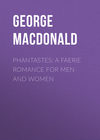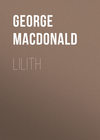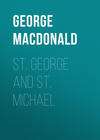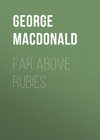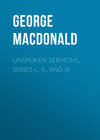Читать книгу: «Phantastes: A Faerie Romance for Men and Women», страница 11
“Alas! alas!” I cried. “I have brought this evil on the best and kindest of friends, who has filled my heart with great gifts.”
“Do not think of that,” she rejoined. “I can bear it very well. You will come back to me some day, I know. But I beg you, for my sake, my dear child, to do one thing. In whatever sorrow you may be, however inconsolable and irremediable it may appear, believe me that the old woman in the cottage, with the young eyes” (and she smiled), “knows something, though she must not always tell it, that would quite satisfy you about it, even in the worst moments of your distress. Now you must go.”
“But how can I go, if the waters are all about, and if the doors all lead into other regions and other worlds?”
“This is not an island,” she replied; “but is joined to the land by a narrow neck; and for the door, I will lead you myself through the right one.”
She took my hand, and led me through the third door; whereupon I found myself standing in the deep grassy turf on which I had landed from the little boat, but upon the opposite side of the cottage. She pointed out the direction I must take, to find the isthmus and escape the rising waters.
Then putting her arms around me, she held me to her bosom; and as I kissed her, I felt as if I were leaving my mother for the first time, and could not help weeping bitterly. At length she gently pushed me away, and with the words, “Go, my son, and do something worth doing,” turned back, and, entering the cottage, closed the door behind her. I felt very desolate as I went.
CHAPTER XX
“Thou hadst no fame; that which thou didst like good
Was but thy appetite that swayed thy blood
For that time to the best; for as a blast
That through a house comes, usually doth cast
Things out of order, yet by chance may come
And blow some one thing to his proper room,
So did thy appetite, and not thy zeal,
Sway thee by chance to do some one thing well.”
FLETCHER’S Faithful Shepherdess.
“The noble hart that harbours vertuous thought
And is with childe of glorious great intent,
Can never rest, until it forth have brought
Th’ eternall brood of glorie excellent.”
SPENSER, The Faerie Queene.
I had not gone very far before I felt that the turf beneath my feet was soaked with the rising waters. But I reached the isthmus in safety. It was rocky, and so much higher than the level of the peninsula, that I had plenty of time to cross. I saw on each side of me the water rising rapidly, altogether without wind, or violent motion, or broken waves, but as if a slow strong fire were glowing beneath it. Ascending a steep acclivity, I found myself at last in an open, rocky country. After travelling for some hours, as nearly in a straight line as I could, I arrived at a lonely tower, built on the top of a little hill, which overlooked the whole neighbouring country. As I approached, I heard the clang of an anvil; and so rapid were the blows, that I despaired of making myself heard till a pause in the work should ensue. It was some minutes before a cessation took place; but when it did, I knocked loudly, and had not long to wait; for, a moment after, the door was partly opened by a noble-looking youth, half-undressed, glowing with heat, and begrimed with the blackness of the forge. In one hand he held a sword, so lately from the furnace that it yet shone with a dull fire. As soon as he saw me, he threw the door wide open, and standing aside, invited me very cordially to enter. I did so; when he shut and bolted the door most carefully, and then led the way inwards. He brought me into a rude hall, which seemed to occupy almost the whole of the ground floor of the little tower, and which I saw was now being used as a workshop. A huge fire roared on the hearth, beside which was an anvil. By the anvil stood, in similar undress, and in a waiting attitude, hammer in hand, a second youth, tall as the former, but far more slightly built. Reversing the usual course of perception in such meetings, I thought them, at first sight, very unlike; and at the second glance, knew that they were brothers. The former, and apparently the elder, was muscular and dark, with curling hair, and large hazel eyes, which sometimes grew wondrously soft. The second was slender and fair, yet with a countenance like an eagle, and an eye which, though pale blue, shone with an almost fierce expression. He stood erect, as if looking from a lofty mountain crag, over a vast plain outstretched below. As soon as we entered the hall, the elder turned to me, and I saw that a glow of satisfaction shone on both their faces. To my surprise and great pleasure, he addressed me thus:
“Brother, will you sit by the fire and rest, till we finish this part of our work?”
I signified my assent; and, resolved to await any disclosure they might be inclined to make, seated myself in silence near the hearth.
The elder brother then laid the sword in the fire, covered it well over, and when it had attained a sufficient degree of heat, drew it out and laid it on the anvil, moving it carefully about, while the younger, with a succession of quick smart blows, appeared either to be welding it, or hammering one part of it to a consenting shape with the rest. Having finished, they laid it carefully in the fire; and, when it was very hot indeed, plunged it into a vessel full of some liquid, whence a blue flame sprang upwards, as the glowing steel entered.
There they left it; and drawing two stools to the fire, sat down, one on each side of me.
“We are very glad to see you, brother. We have been expecting you for some days,” said the dark-haired youth.
“I am proud to be called your brother,” I rejoined; “and you will not think I refuse the name, if I desire to know why you honour me with it?”
“Ah! then he does not know about it,” said the younger. “We thought you had known of the bond betwixt us, and the work we have to do together. You must tell him, brother, from the first.”
So the elder began:
“Our father is king of this country. Before we were born, three giant brothers had appeared in the land. No one knew exactly when, and no one had the least idea whence they came. They took possession of a ruined castle that had stood unchanged and unoccupied within the memory of any of the country people. The vaults of this castle had remained uninjured by time, and these, I presume, they made use of at first. They were rarely seen, and never offered the least injury to any one; so that they were regarded in the neighbourhood as at least perfectly harmless, if not rather benevolent beings. But it began to be observed, that the old castle had assumed somehow or other, no one knew when or how, a somewhat different look from what it used to have. Not only were several breaches in the lower part of the walls built up, but actually some of the battlements which yet stood, had been repaired, apparently to prevent them from falling into worse decay, while the more important parts were being restored. Of course, every one supposed the giants must have a hand in the work, but no one ever saw them engaged in it. The peasants became yet more uneasy, after one, who had concealed himself, and watched all night, in the neighbourhood of the castle, reported that he had seen, in full moonlight, the three huge giants working with might and main, all night long, restoring to their former position some massive stones, formerly steps of a grand turnpike stair, a great portion of which had long since fallen, along with part of the wall of the round tower in which it had been built. This wall they were completing, foot by foot, along with the stair. But the people said they had no just pretext for interfering: although the real reason for letting the giants alone was, that everybody was far too much afraid of them to interrupt them.
“At length, with the help of a neighbouring quarry, the whole of the external wall of the castle was finished. And now the country folks were in greater fear than before. But for several years the giants remained very peaceful. The reason of this was afterwards supposed to be the fact, that they were distantly related to several good people in the country; for, as long as these lived, they remained quiet; but as soon as they were all dead the real nature of the giants broke out. Having completed the outside of their castle, they proceeded, by spoiling the country houses around them, to make a quiet luxurious provision for their comfort within. Affairs reached such a pass, that the news of their robberies came to my father’s ears; but he, alas! was so crippled in his resources, by a war he was carrying on with a neighbouring prince, that he could only spare a very few men, to attempt the capture of their stronghold. Upon these the giants issued in the night, and slew every man of them. And now, grown bolder by success and impunity, they no longer confined their depredations to property, but began to seize the persons of their distinguished neighbours, knights and ladies, and hold them in durance, the misery of which was heightened by all manner of indignity, until they were redeemed by their friends, at an exorbitant ransom. Many knights have adventured their overthrow, but to their own instead; for they have all been slain, or captured, or forced to make a hasty retreat. To crown their enormities, if any man now attempts their destruction, they, immediately upon his defeat, put one or more of their captives to a shameful death, on a turret in sight of all passers-by; so that they have been much less molested of late; and we, although we have burned, for years, to attack these demons and destroy them, dared not, for the sake of their captives, risk the adventure, before we should have reached at least our earliest manhood. Now, however, we are preparing for the attempt; and the grounds of this preparation are these. Having only the resolution, and not the experience necessary for the undertaking, we went and consulted a lonely woman of wisdom, who lives not very far from here, in the direction of the quarter from which you have come. She received us most kindly, and gave us what seems to us the best of advice. She first inquired what experience we had had in arms. We told her we had been well exercised from our boyhood, and for some years had kept ourselves in constant practice, with a view to this necessity.
“‘But you have not actually fought for life and death?’ said she.
“We were forced to confess we had not.
“‘So much the better in some respects,’ she replied. ‘Now listen to me. Go first and work with an armourer, for as long time as you find needful to obtain a knowledge of his craft; which will not be long, seeing your hearts will be all in the work. Then go to some lonely tower, you two alone. Receive no visits from man or woman. There forge for yourselves every piece of armour that you wish to wear, or to use, in your coming encounter. And keep up your exercises. As, however, two of you can be no match for the three giants, I will find you, if I can, a third brother, who will take on himself the third share of the fight, and the preparation. Indeed, I have already seen one who will, I think, be the very man for your fellowship, but it will be some time before he comes to me. He is wandering now without an aim. I will show him to you in a glass, and, when he comes, you will know him at once. If he will share your endeavours, you must teach him all you know, and he will repay you well, in present song, and in future deeds.’
“She opened the door of a curious old cabinet that stood in the room. On the inside of this door was an oval convex mirror. Looking in it for some time, we at length saw reflected the place where we stood, and the old dame seated in her chair. Our forms were not reflected. But at the feet of the dame lay a young man, yourself, weeping.
“‘Surely this youth will not serve our ends,’ said I, ‘for he weeps.’
“The old woman smiled. ‘Past tears are present strength,’ said she.
“‘Oh!’ said my brother, ‘I saw you weep once over an eagle you shot.’
“‘That was because it was so like you, brother,’ I replied; ‘but indeed, this youth may have better cause for tears than that—I was wrong.’
“‘Wait a while,’ said the woman; ‘if I mistake not, he will make you weep till your tears are dry for ever. Tears are the only cure for weeping. And you may have need of the cure, before you go forth to fight the giants. You must wait for him, in your tower, till he comes.’
“Now if you will join us, we will soon teach you to make your armour; and we will fight together, and work together, and love each other as never three loved before. And you will sing to us, will you not?”
“That I will, when I can,” I answered; “but it is only at times that the power of song comes upon me. For that I must wait; but I have a feeling that if I work well, song will not be far off to enliven the labour.”
This was all the compact made: the brothers required nothing more, and I did not think of giving anything more. I rose, and threw off my upper garments.
“I know the uses of the sword,” I said. “I am ashamed of my white hands beside yours so nobly soiled and hard; but that shame will soon be wiped away.”
“No, no; we will not work to-day. Rest is as needful as toil. Bring the wine, brother; it is your turn to serve to-day.”
The younger brother soon covered a table with rough viands, but good wine; and we ate and drank heartily, beside our work. Before the meal was over, I had learned all their story. Each had something in his heart which made the conviction, that he would victoriously perish in the coming conflict, a real sorrow to him. Otherwise they thought they would have lived enough. The causes of their trouble were respectively these:
While they wrought with an armourer, in a city famed for workmanship in steel and silver, the elder had fallen in love with a lady as far beneath him in real rank, as she was above the station he had as apprentice to an armourer. Nor did he seek to further his suit by discovering himself; but there was simply so much manhood about him, that no one ever thought of rank when in his company. This is what his brother said about it. The lady could not help loving him in return. He told her when he left her, that he had a perilous adventure before him, and that when it was achieved, she would either see him return to claim her, or hear that he had died with honour. The younger brother’s grief arose from the fact, that, if they were both slain, his old father, the king, would be childless. His love for his father was so exceeding, that to one unable to sympathise with it, it would have appeared extravagant. Both loved him equally at heart; but the love of the younger had been more developed, because his thoughts and anxieties had not been otherwise occupied. When at home, he had been his constant companion; and, of late, had ministered to the infirmities of his growing age. The youth was never weary of listening to the tales of his sire’s youthful adventures; and had not yet in the smallest degree lost the conviction, that his father was the greatest man in the world. The grandest triumph possible to his conception was, to return to his father, laden with the spoils of one of the hated giants. But they both were in some dread, lest the thought of the loneliness of these two might occur to them, in the moment when decision was most necessary, and disturb, in some degree, the self-possession requisite for the success of their attempt. For, as I have said, they were yet untried in actual conflict. “Now,” thought I, “I see to what the powers of my gift must minister.” For my own part, I did not dread death, for I had nothing to care to live for; but I dreaded the encounter because of the responsibility connected with it. I resolved however to work hard, and thus grow cool, and quick, and forceful.
The time passed away in work and song, in talk and ramble, in friendly fight and brotherly aid. I would not forge for myself armour of heavy mail like theirs, for I was not so powerful as they, and depended more for any success I might secure, upon nimbleness of motion, certainty of eye, and ready response of hand. Therefore I began to make for myself a shirt of steel plates and rings; which work, while more troublesome, was better suited to me than the heavier labour. Much assistance did the brothers give me, even after, by their instructions, I was able to make some progress alone. Their work was in a moment abandoned, to render any required aid to mine. As the old woman had promised, I tried to repay them with song; and many were the tears they both shed over my ballads and dirges. The songs they liked best to hear were two which I made for them. They were not half so good as many others I knew, especially some I had learned from the wise woman in the cottage; but what comes nearest to our needs we like the best.
The king sat on his throne
Glowing in gold and red;
The crown in his right hand shone,
And the gray hairs crowned his head.
His only son walks in,
And in walls of steel he stands:
Make me, O father, strong to win,
With the blessing of holy hands.”
He knelt before his sire,
Who blessed him with feeble smile
His eyes shone out with a kingly fire,
But his old lips quivered the while.
“Go to the fight, my son,
Bring back the giant’s head;
And the crown with which my brows have done,
Shall glitter on thine instead.”
“My father, I seek no crowns,
But unspoken praise from thee;
For thy people’s good, and thy renown,
I will die to set them free.”
The king sat down and waited there,
And rose not, night nor day;
Till a sound of shouting filled the air,
And cries of a sore dismay.
Then like a king he sat once more,
With the crown upon his head;
And up to the throne the people bore
A mighty giant dead.
And up to the throne the people bore
A pale and lifeless boy.
The king rose up like a prophet of yore,
In a lofty, deathlike joy.
He put the crown on the chilly brow:
“Thou should’st have reigned with me
But Death is the king of both, and now
I go to obey with thee.
“Surely some good in me there lay,
To beget the noble one.”
The old man smiled like a winter day,
And fell beside his son.
“O lady, thy lover is dead,” they cried;
“He is dead, but hath slain the foe;
He hath left his name to be magnified
In a song of wonder and woe.”
“Alas! I am well repaid,” said she,
“With a pain that stings like joy:
For I feared, from his tenderness to me,
That he was but a feeble boy.
“Now I shall hold my head on high,
The queen among my kind;
If ye hear a sound, ‘tis only a sigh
For a glory left behind.”
The first three times I sang these songs they both wept passionately. But after the third time, they wept no more. Their eyes shone, and their faces grew pale, but they never wept at any of my songs again.
CHAPTER XXI
“I put my life in my hands.”
—The Book of Judges.
At length, with much toil and equal delight, our armour was finished. We armed each other, and tested the strength of the defence, with many blows of loving force. I was inferior in strength to both my brothers, but a little more agile than either; and upon this agility, joined to precision in hitting with the point of my weapon, I grounded my hopes of success in the ensuing combat. I likewise laboured to develop yet more the keenness of sight with which I was naturally gifted; and, from the remarks of my companions, I soon learned that my endeavours were not in vain.
The morning arrived on which we had determined to make the attempt, and succeed or perish—perhaps both. We had resolved to fight on foot; knowing that the mishap of many of the knights who had made the attempt, had resulted from the fright of their horses at the appearance of the giants; and believing with Sir Gawain, that, though mare’s sons might be false to us, the earth would never prove a traitor. But most of our preparations were, in their immediate aim at least, frustrated.
We rose, that fatal morning, by daybreak. We had rested from all labour the day before, and now were fresh as the lark. We bathed in cold spring water, and dressed ourselves in clean garments, with a sense of preparation, as for a solemn festivity. When we had broken our fast, I took an old lyre, which I had found in the tower and had myself repaired, and sung for the last time the two ballads of which I have said so much already. I followed them with this, for a closing song:
Oh, well for him who breaks his dream
With the blow that ends the strife
And, waking, knows the peace that flows
Around the pain of life!
We are dead, my brothers! Our bodies clasp,
As an armour, our souls about;
This hand is the battle-axe I grasp,
And this my hammer stout.
Fear not, my brothers, for we are dead;
No noise can break our rest;
The calm of the grave is about the head,
And the heart heaves not the breast.
And our life we throw to our people back,
To live with, a further store;
We leave it them, that there be no lack
In the land where we live no more.
Oh, well for him who breaks his dream
With the blow that ends the strife
And, waking, knows the peace that flows
Around the noise of life!
As the last few tones of the instrument were following, like a dirge, the death of the song, we all sprang to our feet. For, through one of the little windows of the tower, towards which I had looked as I sang, I saw, suddenly rising over the edge of the slope on which our tower stood, three enormous heads. The brothers knew at once, by my looks, what caused my sudden movement. We were utterly unarmed, and there was no time to arm.
But we seemed to adopt the same resolution simultaneously; for each caught up his favourite weapon, and, leaving his defence behind, sprang to the door. I snatched up a long rapier, abruptly, but very finely pointed, in my sword-hand, and in the other a sabre; the elder brother seized his heavy battle-axe; and the younger, a great, two-handed sword, which he wielded in one hand like a feather. We had just time to get clear of the tower, embrace and say good-bye, and part to some little distance, that we might not encumber each other’s motions, ere the triple giant-brotherhood drew near to attack us. They were about twice our height, and armed to the teeth. Through the visors of their helmets their monstrous eyes shone with a horrible ferocity. I was in the middle position, and the middle giant approached me. My eyes were busy with his armour, and I was not a moment in settling my mode of attack. I saw that his body-armour was somewhat clumsily made, and that the overlappings in the lower part had more play than necessary; and I hoped that, in a fortunate moment, some joint would open a little, in a visible and accessible part. I stood till he came near enough to aim a blow at me with the mace, which has been, in all ages, the favourite weapon of giants, when, of course, I leaped aside, and let the blow fall upon the spot where I had been standing. I expected this would strain the joints of his armour yet more. Full of fury, he made at me again; but I kept him busy, constantly eluding his blows, and hoping thus to fatigue him. He did not seem to fear any assault from me, and I attempted none as yet; but while I watched his motions in order to avoid his blows, I, at the same time, kept equal watch upon those joints of his armour, through some one of which I hoped to reach his life. At length, as if somewhat fatigued, he paused a moment, and drew himself slightly up; I bounded forward, foot and hand, ran my rapier right through to the armour of his back, let go the hilt, and passing under his right arm, turned as he fell, and flew at him with my sabre. At one happy blow I divided the band of his helmet, which fell off, and allowed me, with a second cut across the eyes, to blind him quite; after which I clove his head, and turned, uninjured, to see how my brothers had fared. Both the giants were down, but so were my brothers. I flew first to the one and then to the other couple. Both pairs of combatants were dead, and yet locked together, as in the death-struggle. The elder had buried his battle-axe in the body of his foe, and had fallen beneath him as he fell. The giant had strangled him in his own death-agonies. The younger had nearly hewn off the left leg of his enemy; and, grappled with in the act, had, while they rolled together on the earth, found for his dagger a passage betwixt the gorget and cuirass of the giant, and stabbed him mortally in the throat. The blood from the giant’s throat was yet pouring over the hand of his foe, which still grasped the hilt of the dagger sheathed in the wound. They lay silent. I, the least worthy, remained the sole survivor in the lists.
As I stood exhausted amidst the dead, after the first worthy deed of my life, I suddenly looked behind me, and there lay the Shadow, black in the sunshine. I went into the lonely tower, and there lay the useless armour of the noble youths—supine as they.
Ah, how sad it looked! It was a glorious death, but it was death. My songs could not comfort me now. I was almost ashamed that I was alive, when they, the true-hearted, were no more. And yet I breathed freer to think that I had gone through the trial, and had not failed. And perhaps I may be forgiven, if some feelings of pride arose in my bosom, when I looked down on the mighty form that lay dead by my hand.
“After all, however,” I said to myself, and my heart sank, “it was only skill. Your giant was but a blunderer.”
I left the bodies of friends and foes, peaceful enough when the death-fight was over, and, hastening to the country below, roused the peasants. They came with shouting and gladness, bringing waggons to carry the bodies. I resolved to take the princes home to their father, each as he lay, in the arms of his country’s foe. But first I searched the giants, and found the keys of their castle, to which I repaired, followed by a great company of the people. It was a place of wonderful strength. I released the prisoners, knights and ladies, all in a sad condition, from the cruelties and neglects of the giants. It humbled me to see them crowding round me with thanks, when in truth the glorious brothers, lying dead by their lonely tower, were those to whom the thanks belonged. I had but aided in carrying out the thought born in their brain, and uttered in visible form before ever I laid hold thereupon. Yet I did count myself happy to have been chosen for their brother in this great deed.
After a few hours spent in refreshing and clothing the prisoners, we all commenced our journey towards the capital. This was slow at first; but, as the strength and spirits of the prisoners returned, it became more rapid; and in three days we reached the palace of the king. As we entered the city gates, with the huge bulks lying each on a waggon drawn by horses, and two of them inextricably intertwined with the dead bodies of their princes, the people raised a shout and then a cry, and followed in multitudes the solemn procession.
I will not attempt to describe the behaviour of the grand old king. Joy and pride in his sons overcame his sorrow at their loss. On me he heaped every kindness that heart could devise or hand execute. He used to sit and question me, night after night, about everything that was in any way connected with them and their preparations. Our mode of life, and relation to each other, during the time we spent together, was a constant theme. He entered into the minutest details of the construction of the armour, even to a peculiar mode of riveting some of the plates, with unwearying interest. This armour I had intended to beg of the king, as my sole memorials of the contest; but, when I saw the delight he took in contemplating it, and the consolation it appeared to afford him in his sorrow, I could not ask for it; but, at his request, left my own, weapons and all, to be joined with theirs in a trophy, erected in the grand square of the palace. The king, with gorgeous ceremony, dubbed me knight with his own old hand, in which trembled the sword of his youth.
During the short time I remained, my company was, naturally, much courted by the young nobles. I was in a constant round of gaiety and diversion, notwithstanding that the court was in mourning. For the country was so rejoiced at the death of the giants, and so many of their lost friends had been restored to the nobility and men of wealth, that the gladness surpassed the grief. “Ye have indeed left your lives to your people, my great brothers!” I said.
But I was ever and ever haunted by the old shadow, which I had not seen all the time that I was at work in the tower. Even in the society of the ladies of the court, who seemed to think it only their duty to make my stay there as pleasant to me as possible, I could not help being conscious of its presence, although it might not be annoying me at the time. At length, somewhat weary of uninterrupted pleasure, and nowise strengthened thereby, either in body or mind, I put on a splendid suit of armour of steel inlaid with silver, which the old king had given me, and, mounting the horse on which it had been brought to me, took my leave of the palace, to visit the distant city in which the lady dwelt, whom the elder prince had loved. I anticipated a sore task, in conveying to her the news of his glorious fate: but this trial was spared me, in a manner as strange as anything that had happened to me in Fairy Land.

